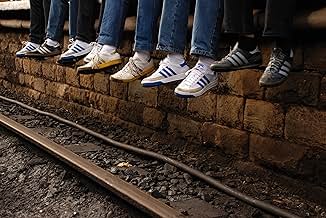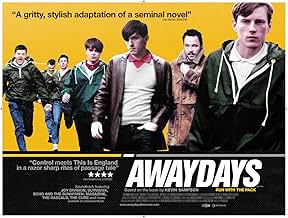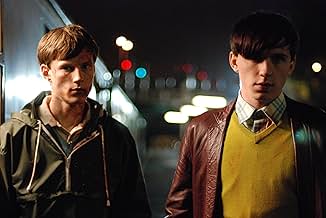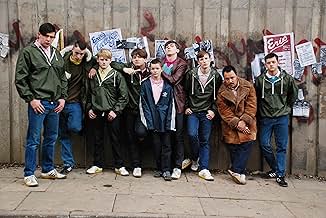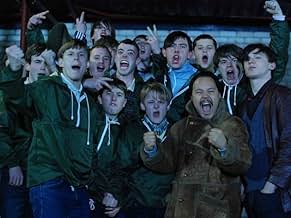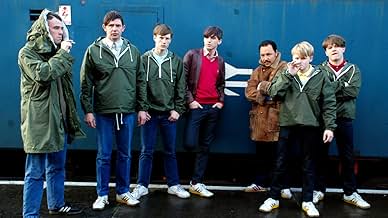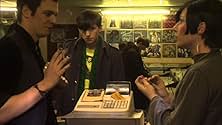AVALIAÇÃO DA IMDb
5,7/10
3,9 mil
SUA AVALIAÇÃO
Adicionar um enredo no seu idiomaIn the grim early years of Margaret Thatcher's premiership, also the crown years of hooliganism, the opportunities for thrill-seeking young men are what they've always been: sex, drugs, rock... Ler tudoIn the grim early years of Margaret Thatcher's premiership, also the crown years of hooliganism, the opportunities for thrill-seeking young men are what they've always been: sex, drugs, rock n' roll, fashion, football and fighting.In the grim early years of Margaret Thatcher's premiership, also the crown years of hooliganism, the opportunities for thrill-seeking young men are what they've always been: sex, drugs, rock n' roll, fashion, football and fighting.
- Prêmios
- 1 vitória no total
Michael Ryan
- Marty
- (as Micheal Ryan)
Anthony Borrows
- Pee Wee
- (as Anthony Burrows)
Holliday Grainger
- Molly
- (as Holliday Granger)
Lianne Sorsa
- Suzy
- (as Lianna Sorza)
Dannielle Malone
- Janie
- (as Danielle Malone)
Avaliações em destaque
Awaydays is a very misunderstood film in some respects. Had it been made in a time when we weren't already saturated with "football hooligan" films I genuinely believe it would've been much better received. Like Alan Clarke's 1988 "The Firm" which also uses football violence as a backdrop, Awaydays is much deeper than the likes of Football Factory. It's a story about two young lads both in that gap between being at school and entering the grown up real world if you like.
The two main characters are (I'm guessing) aged about 19 and both have dreams but neither has direction. What they have in common is they both want one another's life. It's almost tragic, because neither is going anywhere really.
After initially forming a close bond (and it's suggested that Elvis has romantic feelings towards Carty) their friendship soon starts to fall apart when the underlying reality that they are nothing alike surfaces. Neither are particularly likeable character's albeit in different ways. Elvis is probably the worse of the pair but has a very likeable side to him, he's the cool one of The Pack if you like, and the hooligan side of him is only one of a few personalities he seems to live.
Awaydays is gritty, and it's northern setting fits the story perfectly. I've read a lot of other reviews commenting on how fake the scouse accents are, but the film isn't set in Liverpool it's set on the Wirral, Birkenhead to be exact and I suppose given it's location it is a little like a Liverpool accent but slightly off if that makes sense?
Anyway, if you're expecting a football hooligan film you could be sorely disappointed. If you want to watch a decent coming of age drama with a great story I would highly recommend Awaydays.
The two main characters are (I'm guessing) aged about 19 and both have dreams but neither has direction. What they have in common is they both want one another's life. It's almost tragic, because neither is going anywhere really.
After initially forming a close bond (and it's suggested that Elvis has romantic feelings towards Carty) their friendship soon starts to fall apart when the underlying reality that they are nothing alike surfaces. Neither are particularly likeable character's albeit in different ways. Elvis is probably the worse of the pair but has a very likeable side to him, he's the cool one of The Pack if you like, and the hooligan side of him is only one of a few personalities he seems to live.
Awaydays is gritty, and it's northern setting fits the story perfectly. I've read a lot of other reviews commenting on how fake the scouse accents are, but the film isn't set in Liverpool it's set on the Wirral, Birkenhead to be exact and I suppose given it's location it is a little like a Liverpool accent but slightly off if that makes sense?
Anyway, if you're expecting a football hooligan film you could be sorely disappointed. If you want to watch a decent coming of age drama with a great story I would highly recommend Awaydays.
Tried desperately hard to enjoy this film and it seemed to start off OK but the mixed story lines, and slow moving scenes etc meant I was nodding off about half way through and found it a struggle to get to the end.
Some good bits but too jumbled and so many loose ends to really enjoy along with a damp squid of an ending that did it no favours. The sound track was probably the most enjoyable element with some decent 70's 80's tunes throughout.
As hooligan films go, bit more realistic in places than sum such as Green St which is utter tosh but not on the same level as the original film of the 'Firm' with Gary Oldman which is a classic and still the best in my opinion.
Some good bits but too jumbled and so many loose ends to really enjoy along with a damp squid of an ending that did it no favours. The sound track was probably the most enjoyable element with some decent 70's 80's tunes throughout.
As hooligan films go, bit more realistic in places than sum such as Green St which is utter tosh but not on the same level as the original film of the 'Firm' with Gary Oldman which is a classic and still the best in my opinion.
The year is 1978; the hippies have been replaced by the punk rockers, the depressive artists following acts like Lou Reed, Ultravox and Joy Division under the ever gloomy landscape of Margaret Thatcher's reformed Great Britain. For many it was a time to put your head down and get on with it, no matter how depressing it might have been—and then for other's it was more of an opportunity to let loose; to express the frustration built up inside by the disappointing anti-climax of the nineteen-sixties revolutions; their now forgotten refrain of "all you need is love" now replaced with council flats, minimum wage and a cheap night out at the pub to somehow make up for a day's soul-crushing monotony. Yeah, it wasn't a pretty time, and some people didn't necessarily want to make it any better. Nope, rather it was not uncommon for youngsters of the time who had nothing better to do (no jobs, no prospects, and no educational benefits) to indulge in past-times akin to pouring salt in a wound or prodding at a loose tooth just for the sake of reminding yourself of your dire situation. The country had a massive abscess, and rather than going to dentist to get it seen to, the youth would seek to the anger out through arbitrary fights with rival football fans, just for the sake of it. Sure, in retrospect it might seem a little melodramatic coming from a culture that produced the moody post-punk acts of the seventies, but Awaydays seeks to marry that sense of romance, with something a little more human too.
For the most part, director Pat Holden succeeds in bringing out the potency to Kevin Sampson's novel that strives to overcome the somewhat petty, pedestrian nature of this "football hooliganism" counter-culture. The movie's first act which focuses highly on the utterly detestable and seemingly unredeemable characters who would take part in these shallow acts of psychological transference, is unsurprisingly the weakest—but what comes after is something a little more enlightening and insightful. After spending a good half hour with these chaps that you'd probably find hanging outside your local cinema harassing customer's to buy them a "bevy from the offy", Holden takes some time away from the cliché elements of Sampson's novel (domestic quibbles and teenage angst) and brings the focus onto the budding friendship of its two central characters Elvis (Liam Boyle) and Paul Carty (Nicky Bell) who are more than just drunken thugs with zero prospects.
Carty is an art-school dropout who finds a lifestyle he is suddenly attracted to in the form of Elvis who is an aspiring, romantic artist who also dabbles in a bit of thuggery and drugs to make sure he's not perceived as a "total ****". Both share a common love of girls, popular, rebellious music and of course, football—or rather, beating up football fans. Unfortunately, going by scripture set in vinyl by their Godfather Ian Curtis while this common ground brings them together for short periods of time, it also tears them apart. From the offset, Carty comes off as a day-tripping tourist in search of a few months living like common people, and Elvis as an overly self-conscious sheep who is never quite sure of what he wants or how to get it—yeah, teenagers. This in turn with Holden's persistence that his feature be brimming and truthful with the emotional roller-coaster that was teenage life of the time is going to disgruntle viewers, but only because of the subject matter, rather than the way in which he portrays such subjects. Rather, taken from a distance, Awaydays is surprisingly reflective of those troublesome years, but never succumbs to the one-track mind-frame that dominates its central characters—these guys have more faults than virtues sure, but Holden makes sure to give them more than one dimension that is fleshed out after the first act into a dynamic that is thought-provoking and insightful enough to make you forget their misgivings.
What really helps to keep Awaydays afloat however are the performances of its central cast who, spearheaded by the charismatic and nuanced portrayals of Elvis and Carty, nail the humanist tones that echo throughout Sampson's story. So as the movie goes on, it gets to a certain point where you actually feel for these two guys and their situation—you may not like them, but they become more than just caricature thugs glorifying their right to expression by cutting up strangers' faces. Of course, there are still problems going into the film's closing stages which result largely from the melodrama associated with all this romantic tint put on the two character's plight, but when taken in context of Holden's otherwise extremely grim and bleak tale of late seventies street crime, such minor distractions fail to take any major precedence. The result is a surprisingly mature memoir of a time dominated by teenage angst and rebellion against a rather inhospitable society that—although flawed—works far more than it necessarily should.
For the most part, director Pat Holden succeeds in bringing out the potency to Kevin Sampson's novel that strives to overcome the somewhat petty, pedestrian nature of this "football hooliganism" counter-culture. The movie's first act which focuses highly on the utterly detestable and seemingly unredeemable characters who would take part in these shallow acts of psychological transference, is unsurprisingly the weakest—but what comes after is something a little more enlightening and insightful. After spending a good half hour with these chaps that you'd probably find hanging outside your local cinema harassing customer's to buy them a "bevy from the offy", Holden takes some time away from the cliché elements of Sampson's novel (domestic quibbles and teenage angst) and brings the focus onto the budding friendship of its two central characters Elvis (Liam Boyle) and Paul Carty (Nicky Bell) who are more than just drunken thugs with zero prospects.
Carty is an art-school dropout who finds a lifestyle he is suddenly attracted to in the form of Elvis who is an aspiring, romantic artist who also dabbles in a bit of thuggery and drugs to make sure he's not perceived as a "total ****". Both share a common love of girls, popular, rebellious music and of course, football—or rather, beating up football fans. Unfortunately, going by scripture set in vinyl by their Godfather Ian Curtis while this common ground brings them together for short periods of time, it also tears them apart. From the offset, Carty comes off as a day-tripping tourist in search of a few months living like common people, and Elvis as an overly self-conscious sheep who is never quite sure of what he wants or how to get it—yeah, teenagers. This in turn with Holden's persistence that his feature be brimming and truthful with the emotional roller-coaster that was teenage life of the time is going to disgruntle viewers, but only because of the subject matter, rather than the way in which he portrays such subjects. Rather, taken from a distance, Awaydays is surprisingly reflective of those troublesome years, but never succumbs to the one-track mind-frame that dominates its central characters—these guys have more faults than virtues sure, but Holden makes sure to give them more than one dimension that is fleshed out after the first act into a dynamic that is thought-provoking and insightful enough to make you forget their misgivings.
What really helps to keep Awaydays afloat however are the performances of its central cast who, spearheaded by the charismatic and nuanced portrayals of Elvis and Carty, nail the humanist tones that echo throughout Sampson's story. So as the movie goes on, it gets to a certain point where you actually feel for these two guys and their situation—you may not like them, but they become more than just caricature thugs glorifying their right to expression by cutting up strangers' faces. Of course, there are still problems going into the film's closing stages which result largely from the melodrama associated with all this romantic tint put on the two character's plight, but when taken in context of Holden's otherwise extremely grim and bleak tale of late seventies street crime, such minor distractions fail to take any major precedence. The result is a surprisingly mature memoir of a time dominated by teenage angst and rebellion against a rather inhospitable society that—although flawed—works far more than it necessarily should.
- A review by Jamie Robert Ward (http://www.invocus.net)
There seems to be some ill-will towards this tidy little parable and I cannot understand why.
Maybe the Joy Division fanboys feel the material is misplaced but I contend the great soundtrack is only used to set time and place and does not work in reverse like some latter day music vid.
Nor is it a 'hooligan' movie.
My own reaction was that this is a terrific effort, both from a committed cast and production side who nail the period in perfect British bleakness.
The football hooliganism feels like it is intended - a fantastical sideshow and not the main thrust of the film which centres around a lower middle-class lad's attempt for acceptance by a pack of working-class hooligans and the unrequited homosexual love between him and the pack's coolest member.
Carty, said middle-class lad, ultimately is a tourist, and the film conveys this superbly while whipping us along for the ride.
Pay little attention to those attempting to fold this boisterous creation into a pigeon hole; it stands on its own as a potent reflection of a sentimentally grim time in British culture.
Entertaining, admirable and bittersweet. Watch it.
Maybe the Joy Division fanboys feel the material is misplaced but I contend the great soundtrack is only used to set time and place and does not work in reverse like some latter day music vid.
Nor is it a 'hooligan' movie.
My own reaction was that this is a terrific effort, both from a committed cast and production side who nail the period in perfect British bleakness.
The football hooliganism feels like it is intended - a fantastical sideshow and not the main thrust of the film which centres around a lower middle-class lad's attempt for acceptance by a pack of working-class hooligans and the unrequited homosexual love between him and the pack's coolest member.
Carty, said middle-class lad, ultimately is a tourist, and the film conveys this superbly while whipping us along for the ride.
Pay little attention to those attempting to fold this boisterous creation into a pigeon hole; it stands on its own as a potent reflection of a sentimentally grim time in British culture.
Entertaining, admirable and bittersweet. Watch it.
Having read Kevin Sampson's thoughtful novel the screen version is something of a disappointment. Characterisation and motivation are largely over-looked in favour of scenes of adrenaline-charged violence. The clothing and style of the era are meticulously created for "The pack" (the hooligan group that Carty joins) but you have to question why the people they fight are generally older less fashionably dressed groups. The pack also emerge from every fight with barely an injury. The music itself is good but often misused - is Joy Division's delicately mournful "The Eternal" really an appropriate soundtrack to a group of bovver boys snarling their way down the street? Shane Meadows "This is England" offers a far superior vision of the period.
Você sabia?
- CuriosidadesDuring one scene, Elvis talks about the idea of hanging himself whilst listening to "New Dawn Fades" by Joy Division. In 1980, Ian Curtis, the lead singer of Joy Division actually commited suicide the same way.
- Erros de gravaçãoThe "scouse" accents of nearly all the characters are clearly fake.
- Cenas durante ou pós-créditosThe credits thank "Nicola & Eddy at Camel Llairds". The correct spelling of this famous shipbuilder is "Cammell Laird"
- Trilhas sonorasNag Nag Nag
Written by Richard H. Kirk, Stephen Mallinder and Chris Watson
Performed by Cabaret Voltaire, bass & vocals Stephen Mallinder
Courtesy of Rough Trade Records
Principais escolhas
Faça login para avaliar e ver a lista de recomendações personalizadas
- How long is Awaydays?Fornecido pela Alexa
Detalhes
Bilheteria
- Faturamento bruto mundial
- US$ 131.265
- Tempo de duração
- 1 h 45 min(105 min)
- Cor
Contribua para esta página
Sugerir uma alteração ou adicionar conteúdo ausente


